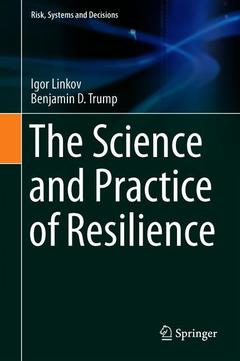The Science and Practice of Resilience, 1st ed. 2019 Risk, Systems and Decisions Series
Auteurs : Linkov Igor, Trump Benjamin D.

This book offers a comprehensive view on resilience based upon state-of-the-science theories and methodological applications that resilience may fill. Specifically, this text provides a compendium of knowledge on the theory, methods, and practice of resilience across a variety of country and case contexts, and demonstrates how a resilience-based approach can help further improved infrastructure, vibrant societies, and sustainable environments and ecologies, among many others.
Resilience is a term with thousands of years of history. Only recently has resilience been applied to the management of complex interconnected systems, yet its impact as a governing philosophy and an engineering practice has been pronounced. Colloquially, resilience has been used as a synonym for ?bouncing back?. Philosophically and methodologically, however, it is much more. In a world defined by interconnected and interdependent systems such as water, food, energy, transportation, and the internet, asudden and unexpected disruption to one critical system can lead to significant challenges for many others. The Science and Practice of Resilience is beneficial for those seeking to gain a rich knowledge of the resilience world, as well as for practitioners looking for methods and tools by which resilience may be applied in real-world contexts.
PartI: Foundations of Resilience.- Chapter1: Risk and Resilience: Similarities and Differences.- Chapter2: Resilience as Function of Space and Time.- Chapter3: Panarchy: Thinking in Systems and Networks.- Chapter4: Lessons from History.- PartII: Resilience Assessment: State of Science and Governance.- Chapter5: Resilience and Governance.- Chapter6: Resilience Quantification and Assessment.- PartIII: Resilience Management: State of Practice and Case Studies.- Chapter7: The State of Practice.- Chapter8: Metrics-based Approaches.- Chapter9: Applications of Network Science and Systems Thinking.- Chapter10: Conclusion.
Date de parution : 01-2019
Ouvrage de 209 p.
15.5x23.5 cm
